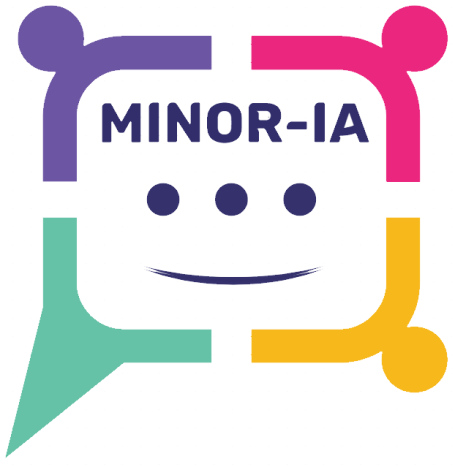MINOR-IA Project
MINOR-IA ADVANTAGE

Enhancing Accessibility, Precision, and Cultural Relevance in Mental Health Care
The MINOR-IA project offers a wide range of benefits aimed at improving mental health care accessibility, accuracy, and sensitivity for speakers of minority languages.
By leveraging AI to conduct mental health assessments directly in a speaker's native language, MINOR-IA addresses longstanding barriers in mental health care, such as cultural misunderstandings, language limitations, and the stigma often associated with seeking help.
These benefits are designed to empower minority communities with access to high-quality, personalized mental health support that is responsive to their unique linguistic and cultural needs.
Faster Detection of Mental Health Difficulties for Early Intervention
A key benefit of MINOR-IA lies in its ability to detect mental health difficulties swiftly and accurately through natural language processing.
Unlike conventional assessment methods, which can be lengthy and influenced by language barriers, MINOR-IA enables real-time analysis of the user’s speech patterns, expressions, and tone, providing an immediate understanding of potential mental health issues. This capability allows for early intervention, which is crucial for preventing the progression of mental health disorders and ensuring timely support.
In many cases, mental health conditions such as depression or anxiety may go undetected in minority language speakers due to limited resources or a lack of cultural understanding. MINOR-IA addresses this gap by analyzing linguistic nuances that may indicate early signs of mental distress, even when the symptoms are expressed in culturally specific terms.
By facilitating quick detection, MINOR-IA improves the overall assessment process, making mental health care more responsive to the diverse expressions and cultural backgrounds of minority language speakers.
Enhanced Accessibility and Availability Through AI-Powered Support
MINOR-IA also significantly improves accessibility by providing AI-powered chatbots and virtual assistants that offer 24/7 mental health support. This constant availability ensures that minority language communities can access guidance and resources at any time, regardless of geographical or social limitations. For individuals who may face challenges in attending in-person consultations or feel uncomfortable discussing their mental health face-to-face, the virtual accessibility provided by MINOR-IA is invaluable.
Improved Efficiency in Training and Support for Mental Health Professionals
MINOR-IA’s AI-driven tools extend beyond patient support to offer valuable resources for mental health professionals, particularly those working with diverse linguistic communities. Through simulations and interactive scenarios tailored to specific cultural and linguistic contexts, MINOR-IA provides a practical training platform for clinicians.
These AI-powered tools enable mental health professionals to engage in realistic case studies that reflect the linguistic and cultural nuances of minority populations, enhancing their diagnostic skills and cultural competence.
Additionally, MINOR-IA offers analytical tools that generate detailed insights into patient behaviors and symptoms, aiding therapists in understanding the unique needs of minority communities. This in-depth analysis provides mental health professionals with a more comprehensive understanding of culturally specific symptoms and patterns, allowing them to adjust their approaches accordingly.
Precision and Personalization of Treatment Plans
Personalization is a critical benefit of MINOR-IA, as it enables the creation of individualized treatment plans tailored to each person’s unique needs, language, and cultural context.
Through advanced data analysis, MINOR-IA examines vast amounts of information on user behaviors, linguistic patterns, and emotional expressions. This data-driven approach enables the system to tailor interventions that resonate with the individual’s personal and cultural background, enhancing the likelihood of successful outcomes.
This precision in personalization extends to ongoing treatment adjustments as well. As users interact with the system, their feedback and progress are continuously monitored, enabling MINOR-IA to refine and modify treatment recommendations to best suit their evolving needs. This adaptability not only enhances the accuracy of care but also provides users with a sense of agency in their mental health journey, reinforcing their trust in the process.
Reducing Stigma Through Confidential and Anonymous Interactions
Mental health stigma remains a significant barrier in many communities, particularly among minority language speakers, where cultural beliefs or social expectations may discourage individuals from seeking help. Recognizing this challenge, MINOR-IA provides a platform that promotes confidential and anonymous interaction, allowing users to engage with mental health resources without the fear of judgment or social stigma.
This sense of anonymity is crucial for individuals who may feel uncomfortable discussing their mental health openly. By using AI to facilitate virtual, private communication, MINOR-IA provides a safe space where users can share their thoughts and concerns without revealing their identity. This encourages more open and honest interaction, allowing users to address sensitive issues that they might otherwise suppress.
For communities where mental health discussions are considered taboo, MINOR-IA’s approach can significantly increase willingness to seek help, thereby expanding access to mental health support and reducing stigma-related barriers.
Promoting Culturally Sensitive and Inclusive Mental Health Support
A unique advantage of MINOR-IA is its commitment to cultural sensitivity and inclusivity, ensuring that mental health support is not only linguistically accessible but also respectful of cultural nuances and practices. The AI-driven system is designed to recognize and adapt to cultural expressions, beliefs, and values associated with mental health in different communities.
By creating a culturally inclusive environment, MINOR-IA makes mental health care more approachable for individuals who may otherwise feel alienated by traditional models. This cultural sensitivity allows users to receive mental health support that resonates with their worldview and personal experiences, making it easier for them to engage in the treatment process.
We need your consent to load the translations
We use a third-party service to translate the website content that may collect data about your activity. Please review the details in the privacy policy and accept the service to view the translations.
